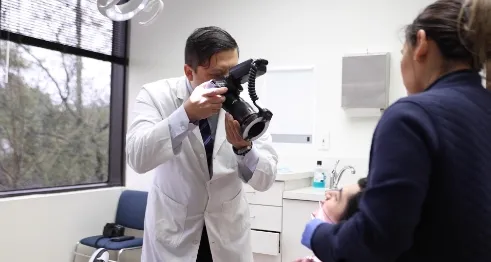Pre-Op & Post-Op Oral Surgery Instructions Houston
Helping You Make a Fast Recovery

Our team at Piney Point Oral & Maxillofacial Surgery of Houston will provide you with detailed post-operative and pre-operative instructions before your surgery date to help you make a speedy and complication-free recovery. We’ve also outlined some general oral surgery instructions below for your convenience.
Pre-Op Instructions for Oral Surgery

- Your mouth and teeth should be cleaned immediately before your appointment.
- It is essential that you bring a responsible adult with you who can drive you home. We ask that this person be present in the oral surgery office prior to surgery and remain until you are dismissed from the office.
- If the surgery is in the morning, you should have nothing by mouth after midnight the night before surgery. If the surgery is to be in the afternoon, you may have liquids for breakfast and then nothing by mouth until after the surgery. YOU SHOULD NOT HAVE ANYTHING TO EAT OR DRINK FOR AT LEAST SIX HOURS PRIOR TO SURGERY. If the doctor has given you medication to take one or two hours before surgery, it should be taken with only a sip of water.
- If the patient is a child or legally a minor, it is essential for at least one parent or legal guardian to be with them.
- You should wear loose-fitting clothing, preferably with short sleeves. Do not wear a tight collar or necktie. No jewelry should be worn during surgery.
- The profound effects of the sedation will wear off 30 to 45 minutes following surgery, after which you will be discharged from the oral surgery office. However, because of the residual effects of the medication, you should plan to go home and stay in bed for the remainder of the day.
Post-Op Instructions
Fractured Jaw & Osteotomy Surgery Care Instructions
Mobilization
Just as a cast immobilizes other bones for healing, immobilization of the jawbone is necessary when it is broken and surgically repositioned. Wiring of the teeth and immobilization with splints and rubber band traction may be used to position the jawbones for healing. If internal rigid fixation with screws and plates are utilized, movement of the jaw is allowed.
Bleeding
Keep pressure over extraction (surgery) site with gauze for 45 minutes. If bleeding continues, place a fresh gauze pad over extraction (surgery) site and bite hard, applying pressure to the area at 45-minute intervals until the bleeding stops. It is not unusual for saliva to be slightly blood-tinged for several days following surgery.
Appliance Irritation
If you have an oral appliance, like wires, you may experience some irritation to your cheeks or lips. Wax or Vaseline can temporarily be placed over these areas to help reduce discomfort.
Medication
Take pain medication as instructed by the doctor. The first dose should be taken with a clear liquid such as tea or Sprite. After the initial dose, do not take pain medication with just water on an empty stomach. Take the second dose as soon as you feel discomfort after you have had something substantial to drink (soup, milkshake, etc.).
Smoking
Avoid smoking for at least 48 hours following surgery.
Oral Rinsing
Avoid all rinsing for at least six hours after surgery. Beginning the day after surgery, you should rinse gently with mouthwash (Chloraseptic, Peridex, Cepacol) four to five times daily, especially after eating. We encourage our patients to use a water flosser during this time.
Diet
You should have a LIQUID DIET ONLY on the day of surgery and the day following surgery. It is important that you maintain a high fluid intake (malts, juices, soup, etc.) of between eight to 10 cups for several days following surgery. Liquids may be taken beginning three hours after surgery. You can also take liquid food supplements like Sego, Metrecal, Sustagen, Boost, etc. We generally recommend that our patinets consume a minimum of 2,000 calories a day to avoid losing weight.
Beginning 48 hours after surgery, you may eat soft foods. After that, you may progress to anything that you feel you can eat unless given other specific instructions by the doctor. No alcoholic beverages should be consumed for at least 24 hours following surgery, or as long as you are taking pain medications.
Ice Packs
Ice packs should be used for the first 48 hours following surgery. It is not unusual to have more swelling on the second postoperative day than was present on the first postoperative day. Beginning 72 hours after surgery (the third day), a heating pad or moist heat should be used for relief of swelling, bruising, and stiffness. Heat should be continued for 30-minute intervals, three or four times daily until the symptoms subside.
Dental Emergencies
If any unusual symptoms should occur, you may reach the doctor 24 hours a day by contacting our surgical office. Proper care following oral surgery will hasten recovery and prevent complications. You should experience progressive improvement in symptoms three to four days after surgery, although tenderness for several days is not unusual, and you should be healed within six to eight weeks. Shortly after this, appliances are removed.
If severe throbbing pain or pain unrelieved by medication persists beyond the third or fourth postoperative day, please notify our oral surgery office. You should also return to this surgical office for your postoperative follow-up visit five to 10 days following surgery.
Molar Surgery (Day Of)
Bleeding
To control bleeding following surgery, firm, consistent pressure should be applied to the surgical site(s) for one hour. This is accomplished by biting down on the sterile gauze sponges that were placed over the site(s) during surgery. These gauze sponges may be removed after one hour. If bleeding continues, the sterile gauze should be re-applied for one-hour periods until it has been controlled. However, it is not necessary to continue using the gauze for slightly blood-tinged saliva which may continue for several days.
Medications
- Antibiotics: Antibiotics should be started four hours after surgery following the first liquid meal and continued until the entire prescription has been taken.
- Anti-inflammatory: If an anti-inflammatory medication (i.e., NSAID, Motrin) has been prescribed, it should also be started four hours after surgery following the first liquid meal. It should be taken every eight hours for three days and may be continued after the third day to control mild pain as necessary.
Anti-inflammatory medications reduce swelling and pain without causing drowsiness. If adequate pain control is achieved with the anti-inflammatory medication, narcotic pain medication may not be necessary. However, the anti-inflammatory medication and the pain medication may be taken at the same time, if necessary, to control discomfort.
- Oral Pain: Medication for pain control may have been administered by the doctor following the surgical procedure. Therefore, narcotic pain medication should not be given unless pain is experienced. This may not occur until several hours after surgery. If necessary, the pain medication may be taken every three to four hours. These medications may cause drowsiness, so driving or use of hazardous equipment should be avoided.
Smoking
Smoking should be avoided for at least 48 hours after surgery.
Ice Packs
Ice packs should be used continuously for 36 hours following surgery.
Diet
A liquid diet may be started three hours after surgery and should be continued for 48 hours. It is important to maintain a high fluid intake (juice, soup, malts, etc.) for several days following surgery.
Oral Rinsing
You may begin rinsing six hours after surgery with a half-Chloraseptic and half-water rinse. Rinse after meals and before bedtime.
Molar Surgery (Day After)
Medications
Antibiotics and anti-inflammatory medications should be continued as directed and pain medication taken as needed.
Ice Packs
Ice packs should be continued throughout the day and may be discontinued at bedtime. It is not unusual to have increased swelling on the first day after surgery.
Diet
A full liquid diet should be continued throughout the day.
Brushing
You may begin brushing your teeth in front the first day after surgery, avoiding the surgical sites until after your postoperative checkup.
Molar Surgery (Second Day After)
Medications
Antibiotics and anti-inflammatory medications should be continued as directed and pain medication taken as needed.
Ice Packs
Ice packs should not be used the second day after surgery.
Diet
A soft food diet may be started, including scrambled eggs, mashed potatoes, and items of similar consistency.
Molar Surgery (Third Day After)
Medications
Antibiotics should be continued until the entire prescription has been taken. Anti-inflammatory medication may be discontinued unless needed for relief of discomfort. Pain medication should be taken only if full relief of discomfort is not achieved with the anti-inflammatory medication.
Heat
If symptoms of swelling, bruising, or stiffness are present, apply a heating pad or moist heat to the affected area three or four times daily for approximately 20 to 30 minutes each time. Heat should be continued until the symptoms subside, which may take several days.
Diet
A regular diet may be resumed, although sharp or chewy items should be avoided for a few more days.
Emergencies
If any unusual symptoms occur, you may reach the doctor 24 hours a day by calling our oral surgery office.
Proper care following oral surgery will hasten recovery and prevent complication. Although tenderness is not unusual for several days, the patient should feel progressively better every day starting three to four days after surgery. If severe throbbing pain or pain unrelieved by medication persists, please notify the oral surgery office.
Regular postoperative visits are scheduled five to 10 days following surgical procedures. This is an important part of comprehensive care. If you are unable to keep this appointment, please call the office.

